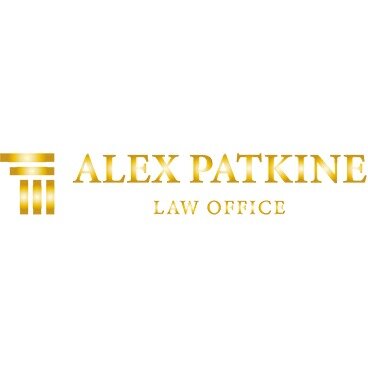Best Employment & Labor Lawyers in Haifa
Share your needs with us, get contacted by law firms.
Free. Takes 2 min.
List of the best lawyers in Haifa, Israel
About Employment & Labor Law in Haifa, Israel
Employment and labor law in Haifa, Israel, is designed to protect the rights of employees and ensure fair working conditions. These laws cover various aspects of the employment relationship, from hiring practices and employment contracts to working conditions, wages, benefits, and termination. Haifa, as a major city with a diverse economy, has a dynamic labor market, and understanding your rights and obligations as an employee or employer is crucial.
Why You May Need a Lawyer
There are several common situations where you might require legal assistance in employment and labor matters:
- Unfair Dismissal: If you believe you were terminated without just cause or due process.
- Employment Contracts: To review, negotiate, or dispute terms within an employment contract.
- Workplace Discrimination or Harassment: If you're experiencing unlawful treatment based on gender, race, religion, or other protected characteristics.
- Wage Disputes: Issues related to unpaid wages, overtime, or other compensation.
- Health and Safety Violations: If your employer is not adhering to workplace safety standards.
- Labor Union Involvement: For issues involving union membership, collective bargaining, and strikes.
- Work Permits and Visas: For non-Israeli workers facing issues with their work permits or visas.
Local Laws Overview
Key aspects of local employment and labor laws in Haifa, Israel include:
- Minimum Wage: The legal minimum wage is regulated and regularly updated by the government to ensure a living wage for employees.
- Working Hours and Overtime: Standard work hours are typically 8 hours per day and 45 hours per week, with overtime compensated at a higher rate.
- Paid Leave: Employees are entitled to various types of paid leave, including annual leave, sick leave, and maternity/paternity leave.
- Termination of Employment: There are specific procedures and protections related to dismissal, including notice periods and severance pay.
- Collective Agreements: Many industries are governed by collective agreements that provide additional rights and benefits.
- Anti-Discrimination Laws: Protection against discrimination in employment based on race, gender, age, religion, and other characteristics.
Frequently Asked Questions
1. What is the minimum wage in Haifa, Israel?
The minimum wage is set by national law and is periodically adjusted by the government. As of the most recent update, the minimum wage is ₪30.61 per hour or ₪5,300 per month for full-time employees.
2. How many hours constitute a full workweek?
A standard workweek in Israel is 45 hours, typically spread over five or six days. Any hours worked beyond this are generally considered overtime and must be compensated at a higher rate.
3. What are my rights if I am unfairly dismissed?
If you believe you have been unfairly dismissed, you have the right to file a complaint with the Labor Court. You may be entitled to compensation, reinstatement, or other remedies.
4. Can my employer change my job responsibilities without my consent?
Job responsibilities can generally be modified within reasonable limits. However, significant changes may require employee consent or could be contested legally if they breach the employment contract.
5. What constitutes workplace discrimination?
Workplace discrimination occurs when an employee is treated unfairly based on race, gender, religion, age, disability, or other protected characteristics. This can include hiring practices, promotions, pay, and workplace environment.
6. How is overtime pay calculated?
Overtime pay is typically 125% of the regular hourly rate for the first two hours and 150% for subsequent hours. Different rules may apply for work on weekends and holidays.
7. What are my rights regarding maternity leave?
Female employees are entitled to 15 weeks of maternity leave, which can be extended under certain conditions. During this period, they are entitled to receive maternity allowance from the National Insurance Institute.
8. How can I join a labor union?
Joining a labor union usually involves completing a membership application and paying membership dues. Your workplace or industry may have specific unions you can join.
9. What should I do if I experience harassment at work?
If you experience harassment at work, you should report it to your employer immediately. If the issue is not resolved, you can file a complaint with the Equal Employment Opportunity Commission or seek legal assistance.
10. Are non-Israeli workers entitled to the same labor rights?
Non-Israeli workers are generally entitled to the same labor rights as Israeli workers, including minimum wage, overtime, and protection from discrimination. Specific rules may apply based on visa and work permit conditions.
Additional Resources
Several resources and organizations can provide assistance with employment and labor issues in Haifa, Israel:
- Ministry of Labor, Social Affairs and Social Services: They provide information on labor laws and regulations.
- National Insurance Institute: Offers details on social benefits, including maternity allowance and unemployment benefits.
- Equal Employment Opportunity Commission: Handles complaints related to workplace discrimination and harassment.
- Histadrut (General Federation of Labor in Israel): Provides support and representation for unionized workers.
- Local Legal Aid Clinics: Offer free or low-cost legal advice on employment matters.
Next Steps
If you need legal assistance in employment and labor matters, here are the steps you should take:
- Document Everything: Keep detailed records of any issues, including dates, communications, and relevant documents.
- Seek Advice: Consult with a legal professional who specializes in employment and labor law to understand your rights and options.
- File a Complaint: If necessary, file a complaint with the relevant governmental body or labor court.
- Negotiate: Consider mediation or negotiation to resolve disputes amicably when possible.
- Stay Informed: Stay up-to-date with any changes in the law and be proactive in protecting your rights.
By following these steps and utilizing available resources, you can navigate employment and labor issues more effectively in Haifa, Israel.
Lawzana helps you find the best lawyers and law firms in Haifa through a curated and pre-screened list of qualified legal professionals. Our platform offers rankings and detailed profiles of attorneys and law firms, allowing you to compare based on practice areas, including Employment & Labor, experience, and client feedback.
Each profile includes a description of the firm's areas of practice, client reviews, team members and partners, year of establishment, spoken languages, office locations, contact information, social media presence, and any published articles or resources. Most firms on our platform speak English and are experienced in both local and international legal matters.
Get a quote from top-rated law firms in Haifa, Israel — quickly, securely, and without unnecessary hassle.
Disclaimer:
The information provided on this page is for general informational purposes only and does not constitute legal advice. While we strive to ensure the accuracy and relevance of the content, legal information may change over time, and interpretations of the law can vary. You should always consult with a qualified legal professional for advice specific to your situation.
We disclaim all liability for actions taken or not taken based on the content of this page. If you believe any information is incorrect or outdated, please contact us, and we will review and update it where appropriate.
Browse employment & labor law firms by service in Haifa, Israel
Haifa, Israel Attorneys in related practice areas.















